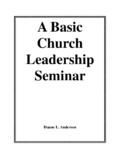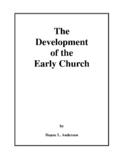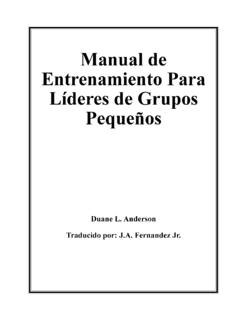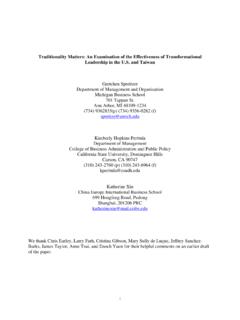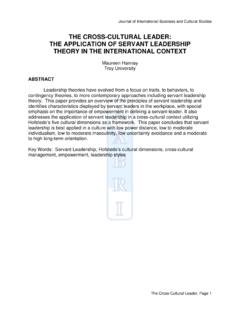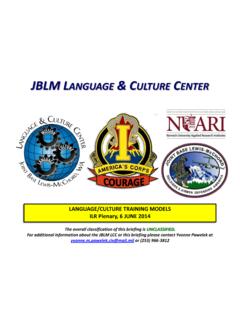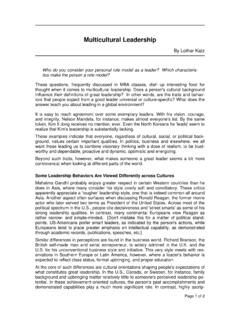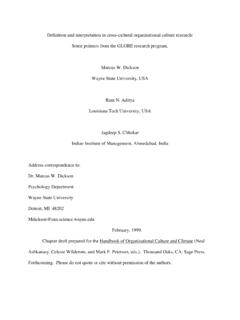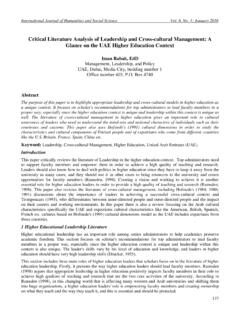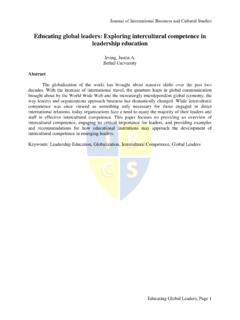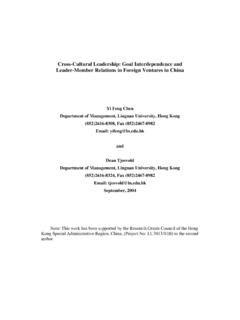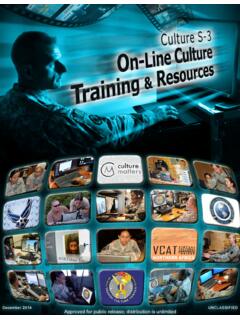Transcription of 75-Eleven Keys for Effective Cross Cultural Ministry - C
1 Eleven keys for Effective Cross Cultural Ministry By Duane L. Anderson Eleven keys for Effective Cross Cultural Ministry Copyright 2007 Duane L. Anderson Scripture quotations in this manual are from the New King James Version 1979, 1980, 1982 Thomas Nelson, Inc. American Indian Bible Institute Box 511 Norwalk, CA 90651-0511 Eleven keys for Effective Cross Cultural Ministry (Contextualization and Scripture) Page Introduction 1 A. Understanding basics for being faithful to Scripture 2 1. Understanding the tricultural obstacle that we face in making the Bible clearly understood today a. Holy men of God spoke as they were moved by the Holy Spirit II Peter 1:19-21 They wrote in their culture They originally wrote to people who knew their culture God led them to write to people of all future cultures b.
2 We live in a world where people serve the gods of this world - Acts 17:16-18 Some we need to begin at creation Acts 17:22-34 Some we need to show compassion John 4:1-42 Some we need to give clarification Acts 17:11-12 Some we need to use confrontation John 3:1-21 c. We share the Word of God as people who live in a very different Cultural context Ephesians 2:1 Some knew the Word from a young child II Timothy 3:15-17 Some followed Christ as a young person Acts 5:6, 10 Some followed Christ as an adult Matthew 4:18-22 2. Understanding the Greek and Hebrew forms of education a. Greek form of education - became the common form of education for the Western (European background) culture b. Hebrew form of education - is the common form of education for the Majority (the rest of the world) culture 3.
3 Challenges in being faithful to the original intent of Scripture and still sensitive to each individual culture a. Most missionaries have a background in the Western culture and the emphasis is on giving knowledge in the Western culture (they received their training in the Greek form of education) b. Most missionary work is carried out in Majority cultures (most grew up with a Hebrew form of education and thought) this means we must include knowledge, character and Ministry skills that emphasize the development of wisdom in most majority cultures B. Understanding Eleven keys for Effective Cross Cultural Ministry 10 1. The Western Culture form of communication is rigid while the Majority Culture is flexible.
4 10 2. The Western Culture has as its goal I know, while the Majority Culture has as its goal I can do. 19 3. The Western Culture expects people to learn by listening while the Majority Culture helps people to learn by doing. 22 4. The Western Culture expects people to learn for Ministry while the Majority Culture helps people to learn in Ministry . 24 5. The Western Culture teaches people through formal means of communication while the Majority Culture trains people through non-formal means of communication.
5 28 6. The Western Culture teaches people to know about God while the Majority Culture helps people to know God. 32 7. In the Western Culture people learn for self while in the Majority Culture people learn so that they can share with others. 35 8. In the Western Culture people receive grades for learning while in the Majority Culture people are rewarded for what they do and especially what they do to help others. 37 9. In the Western Culture the teacher is in front of the students while in the Majority Culture the teacher is working with the students.
6 42 10. In the Western Culture the goal is knowledge while in the Majority Culture the goal is wisdom. 45 11. The Western Culture usually focuses on methods that are culture specific while the Majority Culture usually focuses on principles that will apply in many different cultures. 48 C. Understanding whether we look at the world from a Western culture worldview or a Majority Culture worldview 54 1. What form of communication did we experience as we grew up? 2. Were our goals to learn to know or learn how to do as we grew up? 3. Were we expected to learn by listening or learn by doing as we grew up?
7 4. Did we learn for Ministry or did we learn in Ministry as we grew spiritually? 5. Were we educated mostly through formal means of communication (classroom instruction) or frequently through non-formal means of communication (hands on instruction)? 6. Was the focus of those who instructed us to know about God or did they focus on helping us get to know God personally? 7. During our development did we learn for self (personal benefit) or did we learn to help others? 8. Were we rewarded for learning by grades and other rewards that benefited us personally or were we rewarded for what we did and especially what we did to help others? 9. Did our teachers stand in front of us to teach or did our teachers work with us and give us on-the-job training? 10.
8 Was our goal to gain knowledge or was our goal to learn wisdom? 11. Were we taught by methods that were culture specific or did our teachers help us to learn principles that would apply in many different cultures? D. Understanding why the tricultural obstacle is the most complex of all 65 1. We must help people understand the Cultural context in which the Word of God is written. 2. We must help people understand the culture from which we come (Is it Western Culture or Majority Culture?). 3. We must help people understand the cultures to which we are taking the Gospel and in which we are seeking to plant additional churches. E. Applying this understanding to the development of Effective Ministry 75 1. Is our focus on telling others what the Bible commands them to do or is our focus on showing them how to apply the Word of God in their daily lives?
9 2. Is our goal to help others gain knowledge or is our goal to equip others for Effective Ministry by taking them with us and showing them how to minister? 3. Are we helping people to learn by giving them opportunities to do the things that they are learning as they learn them? 4. Are we helping people to learn in Ministry by taking them with us and showing them how we minister? 5. Are we expecting people to learn to minister through sermons and classes or are we showing them to minister by our example? 6. Are we teaching people about God or are we helping people to get to know and understand how God is working in their daily lives? 7. Are we teaching people just for their own information or are we equipping them so that they can help others? 8. Do we focus on church attendance or do we affirm those who are using what they learn to help others?
10 9. Do we depend on our sermons and classes for people to learn or do we take them with us and show them how to minister through on-the-job training? 10. Do we help people to just gain knowledge of the Word of God or do we help them to understand why they learn what they learn and how to apply it in their daily lives so that they grow in godly wisdom? 11. Do we focus on methods that work in the culture of our church to help our church in its growth or do we help people learn to understand Biblical principles that will transform their lives and help them to reach out to people of many different cultures? Some Concluding Thoughts 87 Introduction In Matthew 28:18-20 Christ said: And Jesus came and spoke to them, saying, "All authority has been given to Me in heaven and on earth.
